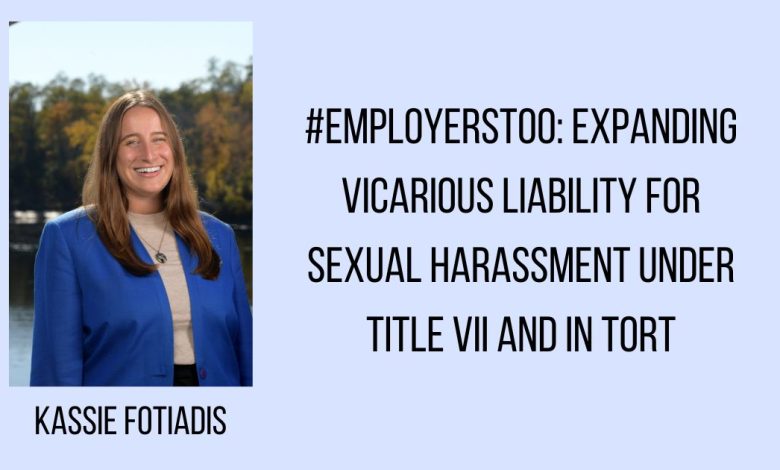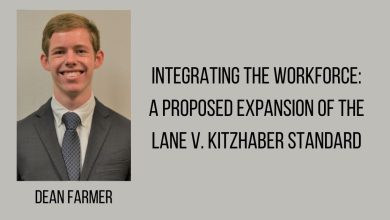
Students at the University of Michigan Law School are able to submit Notes for consideration for publication in the Michigan Law Review. The Res Gestae will be interviewing student authors whose Notes will be published in Vol. 123 of the Michigan Law Review to ask them about their experiences writing and submitting Notes.
Kassie Fotiadis is currently an attorney with plaintiff-side civil rights firm Johnson & Webbert, but prior to that, she was a student at the University of Michigan Law School like so many of us. And as a student, Kassie took the opportunity to write and submit a Note for publication consideration with the Michigan Law Review (MLR).
Kassie’s Note, #EmployersToo: Expanding Vicarious Liability for Sexual Harassment Under Title VII and in Tort, “advocates for expanding vicarious liability for sexual harassment under two legal schemes — the federal civil rights law (Title VII) and in tort law,” analyzing these two areas of law in parallel ways. Furthermore, “half the note is devoted to expanding vicarious liability over Title VII.”
Kassie was inspired to write a Note on this topic after going through her 1L Torts doctrinal class. “Toward the end of the semester, we talked about vicarious liability,” Kassie explained. “There was a footnote in our case book … and we went over it in class, and it said something like ‘although for a lot of intentional torts, employers are held vicariously liable, they’re really not for sexual harassment.’ And that just struck me as really odd. I thought it was a weird carve out, and it almost felt like sexual harassment was being exceptionalized as compared to other tortious content conduct … [And] systemic sexual harassment now more than ever is so embedded in workplaces, and that was just the little kernel that inspired me.”
After starting her Note as the scholarship contribution required for MLR Associate Editors, Kassie found herself enjoying the process and decided that she wanted to keep working on it. She reached out to Professor Roseanna Sommers, who she had heard taught Torts from a feminist perspective and whose own scholarship delves into the intersection between gender law and torts and race law and torts, and was thrilled to hear back from Professor Sommers.
And so the effort to write the Note began in earnest. Kassie set up deadlines for herself, with Professor Sommers’ help and guidance, and began to draft.
Kassie was, herself, in the MLR Notes office, which meant that she couldn’t submit a Note during her own tenure. She didn’t seem to mind that though, because “while I was drafting my own Note … I saw so many examples of good writing. My other editors were such good writers and taught me so much. Sometimes, I would finish a full read and then, frantically, late at night, would add to my Note because I would [see something and think] ‘Oh my God, that’s such a good idea!’”
Her Note, available for preliminary reading on SSRN, is already making some waves. “Just about a month ago, at my firm phone, I got a call and then a follow up email from a professor at GW Law … and she was a professor from practice. She was teaching a class about gender violence law, and she had come across my piece, and it was so cool. We talked on the phone, she told me some of the other materials she was assigning to students, and I think she ended up assigning my Note,” Kassie was excited to report. “We talked a bit afterward, and she told me that it was a really interesting conversation, so that was so cool.”
It’s rare for students to feel like their work is actually of import outside the classroom, so it’s no wonder that this felt monumental to Kassie. “You think that no one reads these things, and obviously the readership isn’t huge, but I do think — especially if [scholarship] is on a practical issue that implicates civil rights and social justice — maybe it will connect with people, or help academics.”
And, in many ways, that’s all anyone can hope for when it comes to writing a Note — feeling like the work they’re doing, the thing they’ve spent so much time on, is meaningful to someone else.
Kassie also touched on advice she would give to students considering writing their own notes: “Don’t feel like there’s only one type of student who’s capable of academic scholarship. It’s not just the students who want to be professors or want to clerk.” And considering experiences outside of traditional expectations isn’t limited to the people writing the scholarship alone — Kassie also looked at resources and research materials beyond the conventional sources. She used cases and treatises, of course, but “also imbued modern stories into there.” It provided a more unique and modern feel to the Note, and worked to great effect.
She also advised taking the opportunity to connect more deeply with a Professor. “I think one of the biggest, coolest things about [writing a Note] is having gotten to work with a Professor that I might not have otherwise interacted with at the law School.
In all, Kassie’s story can serve as inspiration to so many others who are thinking about writing a Note. If you have that little ‘kernel’ of inspiration, just as she did, consider going through with it. You never know what the effect of your own written work could be.
Editor-in-Chief Sabriya Imami can be reached at simami@umich.edu.



